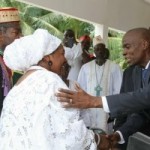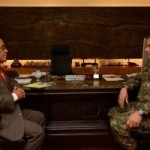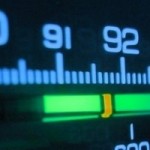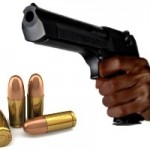Wyclef Jean was in a rare state: nervous. He was trying to stick to his new role of wonky Haitian statesman, but the road kept distracting him.
We were driving through Port-au-Prince as dusk fell, and he would interrupt his own discourse on trade rules or egg imports to ask the driver why a fire was burning on the roadside or to complain that our headlights were tempting danger or to mumble that the police escort, which he suspected of working for the opposition, shouldn’t sound its sirens.
It was three days before Haiti’s presidential election, on March 20. Jean, a Haitian-born rapper, producer and star of the now-disbanded Fugees, had mounted his own run for the presidency but was disqualified from the race because he lives in the United States. When I went to Haiti to meet him, he was stumping for Michel Martelly, a musician who goes by the stage name Sweet Micky, has a well-known history of public nudity and has admitted to using crack cocaine. Martelly might have been the candidate, but with Jean performing at many campaign stops and making the longer speeches, it often seemed as if he were the one running. Jean’s role was to revive the support he had garnered during his own campaign and transfer it to a candidate who was a somewhat less famous version of himself. (It worked. Martelly would be inaugurated as president of Haiti in May.)
Martelly sought the presidency; Jean, something more elusive. Before the 2010 earthquake and more loudly since, he has spoken of wanting to save Haiti from its miseries: crime, corruption, cholera, anemic job growth, swarming tent cities, fruitless aid and deep mistrust of the state. With his pal ascending to power and a whiff of hope in the air, Jean finally has his chance. At 41, he is striving to become a man of influence. While Jean plainly wants to do something for Haiti, there is also, it seems, much that he wants Haiti to do for him.
From a whitewashed hotel in the hills, we descended toward Cité Soleil, Haiti’s most notorious shantytown. Along the route were houses and shops chewed on or swallowed whole by the earthquake 14 months ago. Darkness was coming, and the street life fell away as we approached. Jean now claimed to hear a report on the radio of threats to Martelly’s convoy made by supporters of the rival presidential campaign. “They’re saying our candidate can’t get into Cité Soleil,” he said, treating it more as dare than discouragement. “And I’m bringing him into Cité Soleil.”
All at once, a throng encircled us, climbing onto the vehicle. These men were on Sweet Micky’s side. Jean’s aides, thumbing their BlackBerrys, said shots had been fired in Cité Soleil. But this, apparently, was no reason to alter our plans. The bodyguards pried open the doors of our S.U.V. and told us to run toward a stage that had been set up in the middle of the shantytown. The crowd surged around us. We were enclosed by a ring of bodyguards, but I could feel hands searching deep into my pockets. The scent of sweat and rum and panted breath surrounded us.
We somehow made it to the stage. Below Sweet Micky and Jean was a sea of screaming faces. Martelly delivered his speech, promising a break from the past, leavening the message with a song. But he was merely the opener. Jean, wearing a blue plaid shirt, low-hanging jeans and black Timberlands, exhorted and sang in his raspy, quivering voice. If Haiti is to change, he thundered, it must begin with Cité Soleil.
A crazed man approached. Everyone ignored him except Jean, who bent all the way over to hear him. A slip or pull would have plunged him into that vast human crush, but Jean, who can be paranoid about Haitian officialdom, about its police and politicians, seemed the only one in the campaign not afraid of its crowds. This was, his brother, Sam, later speculated to me, because of something Wyclef perceived growing up in the bleak landscape of the Marlboro projects in Brooklyn, New York: when among Haitians — perhaps only among Haitians — you are safe.
As we returned to the S.U.V., a loud crackle punctured the night. The crowd dispersed. The security men, armed and protected by bulletproof vests, said it was semiautomatic gunfire.

 Haïti – Politique : Moïse commémore les 226 ans de la cérémonie de Bois Caïman
Haïti – Politique : Moïse commémore les 226 ans de la cérémonie de Bois Caïman Haïti – RD : Les autorités militaires dominicaines appuient la formation d’une armée en Haïti
Haïti – RD : Les autorités militaires dominicaines appuient la formation d’une armée en Haïti Haïti – AVIS : Moratoire sur l’octroi de fréquences de radio FM
Haïti – AVIS : Moratoire sur l’octroi de fréquences de radio FM Haïti – FLASH : 94 morts par balles pour les 6 premiers mois
Haïti – FLASH : 94 morts par balles pour les 6 premiers mois
Leave a Reply